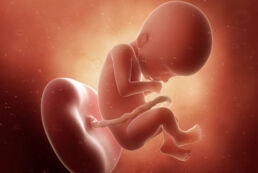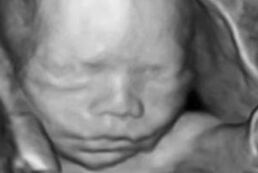Baby's Height and Weight
At the end of the 5th month of pregnancy, the baby is about 28-29 cm long, about the size of a large aubergine. Its weight is about 430-450 grams.
Development of the Baby

Do you have a fidgety little butterfly in you or… One of the most exciting developments of this month is that you will now be able to fully feel your baby’s movements. These movements, which you will feel like the fluttering of a butterfly’s wings at first, will become stronger and stronger day by day.
The development of organs in the 5-month-old baby in the womb was largely completed. Bone marrow formation is also accelerating.
His/her lungs continue to develop, and by the end of the fifth month, he/she will begin to produce a protein (surfactant) that will allow him/her to breathe after birth.
While red blood cells are produced, a substance called bilirubin is also produced. This substance is filtered from the liver and excreted through the urine. If this substance is still not excreted in the baby on the day of birth, it may take a few days for it to be excreted from the body. Bilirubin accumulation leads to jaundice after birth. This situation usually improves by taking the baby out in the sun and feeding him/her a lot.
Thanks to the amniotic fluid, your baby’s developmental stages continue to be completed. This liquid has the task of protecting them against impacts. The baby also breathes by filling and emptying its lungs as it swallows the amniotic fluid. This action is a preparation for her/him breathing after birth. In addition, this fluid keeps the baby’s digestive system working.
Your baby’s thin and pink skin is now covered with a vernix layer at the 5th month of pregnancy. The amount of fat under its skin continues to increase. Two distinct skin layers are formed, the superficial layer (epidermis) and the deep layer (dermis). Epidermal skin continues to develop, forming scars on the fingers and toes, palms and soles of the feet. There are capillaries in the lower layer of the skin. At the top, there are thin hairs called lanugo. The surface of the skin continues to be covered with a layer of Vernix Caseosa, which is as thick as putty.
“As nerve cells develop at 5 months of pregnancy, nerve connections between the brain and the senses also develop. The structure that provides this connection is myelin, a fatty substance that covers and isolates nerves throughout the body. In this week, the baby has as many nerve cells as an adult. As nerve cells develop, the baby becomes able to control his body.
The sense of touch develops further this month. Reflex movements are replaced by conscious actions with awareness. Now he/she is more conscious when touching her/his face and holding the umbilical cord!”
Although the 5-month-old baby in the womb can only taste the amniotic fluid at the moment, his/her taste buds are fully developed enough to be able to feel flavours such as bitter, sweet and sour. Reactions aren’t just against flavors. He/she can now also make leaping movements to loud, upbeat music. It is best if you make him/her listen to relaxing music in the classical music style. At 5 months, the baby can hear the voice of his parents. If you talk to her/him a lot, he/she are very likely to recognize your voice after birth.
Your baby’s genitals have now developed by the 5th month of pregnancy. Baby girls have produced around six million eggs this week. This number decreases to 1-2 million at birth. The baby girl’s uterus and vaginal cavity develop this week. Prostate development in male infants is now complete. His testicles have not yet descended from the abdominal cavity into the ovarian bag.
Eyebrows, hair and nails continue to form in the 5th month of pregnancy.
At five months of pregnancy, your baby spends some of her/his time sleeping. Sleep can last from 20 minutes to 2 hours. Although they can move their eyes left and right, their eyelids are still closed.
“This month, the baby is developing a stool called meconium in his/her intestines.” He/she will continue to accumulate these feces in his/her intestines until birth. The baby is expected not to make this stool in the womb before birth.
5-Month Pregnancy Baby Movements
As the 5-month-old baby moves his/her arms and legs, you may feel a sensation similar to the fluttering of butterflies in your abdomen. Mothers who feel the movements earlier may feel a little stronger from this week on.
5-month-old baby movements in the womb may be felt one day and not for a few days. You will start to feel your baby's movements more consistently from the 7th month onwards.
If you put pressure on your belly with your hand, he/she might respond by pulling away and pushing you back.
Ultrasound Images

Since the nose, lips and tongue are more prominent, the face of the fetus is much clearer in the 5-month pregnancy image.
In the ultrasound image of the 5-month-old baby, he/she can sometimes be seen sleeping and sometimes moving. He/she continues her/his mimics. The ultrasound may make you grimace, smile, or give you an angry look. They can greet you in a thinking position by placing their hand on their chin. They can stretch and stick out their tongue.
The 5-month-old baby can be seen on ultrasound while opening and closing his/her mouth in the womb. He/she also strengthens the jaw muscles by opening and closing the mouth to swallow the amniotic fluid. Thus, after birth, these muscles will be strengthened and ready to suck their mother’s milk.
During your examination, you can hear your baby’s strong heartbeat.
Changes in the Mother's Body
In the 5th month of pregnancy, your uterus continues to grow and rises to the level of your belly button. The height of the fundus (peak of the uterus) was about 22 cm at the end of the 5th month.
Changes in the mother in the 5th month of pregnancy are usually as follows:
– A white discharge from the vagina,
– Pains in the lower part of the abdomen,
– Constipation and leg cramps,
– Burning, indigestion and gas problem in the stomach,
– Changes in the abdomen and face skin color,
– Acceleration in heart rate as blood pressure will increase,
– Headaches and feeling faint,
– Hair growth,
– Rapid growth of hair and nails,
– Nasal congestion,
– Hot flashes and more frequent sweating,
– Dizzy and faint feeling.
Triple or Quadruple Test
In the 5th month of pregnancy, if you have not yet done so, your doctor may ask you for a Triple Test or Quadruple Test, which is recommended between 16-20 weeks. These tests may not be requested in pregnant women who have not been identified with any risk in the Dual Test. Even if the results of the dual test are normal, factors such as the age of the expectant mother and the presence of a potential genetic condition in the family may still require these tests to be performed. In these tests, the baby's main organs, body systems, head and spine structure, brain structure, position of the placenta, volume of amniotic fluid, baby's heartbeat, blood vessels and gender are examined. The difference of the Quadruple Test from the Triple Test is that it is more comprehensive. Today, doctors prefer the quadruple test because it is more comprehensive. If risky situations are detected in the Triple Test or Quadruple Test, the doctor may recommend amniocentesis or other tests to the expectant mother.
Points need to be considered
Abdominal Cracks
Cracks and dryness may occur with the feeling of stretching in your abdomen in the 5th month of pregnancy. You can moisturize your abdomen every day with natural oils such as almond oil, cocoa butter or coconut oil, or with the blended oil you get from them.
Reduce Stress with Exercise
Try not to be as stressful as possible during pregnancy. Stress, unfortunately, can lead to premature birth and negative situations in the baby that lead to low birth weight. One of the best ways to reduce stress is to exercise regularly so that you can relax.
When exercising during pregnancy, you should pay attention to:
– Start the exercise with warm-up movements and slowly,
– Do not accelerate too much during the exercise. End the exercise slowly. Expectant mothers who do not do sports before pregnancy should limit their exercise time to 20-30 minutes. Those who do sports before pregnancy can exercise a little longer with the approval of a doctor,
– Do the exercises at a certain time and regularly,
– Wear comfortable, flexible and thin clothes while exercising,
– Drink plenty of water after exercise,
– Do not make movements that will force yourself too much. Take a break when you feel like you're struggling,
– Do not start exercising on an empty stomach. Otherwise, your blood sugar will drop and you may feel faint,
– Keep the environment where you exercise cool.
Canbebe on Social Media!
Join our community of mothers and fathers on social media. Be close to caring community, sharing advices between each other on our everyday life with our baby.
